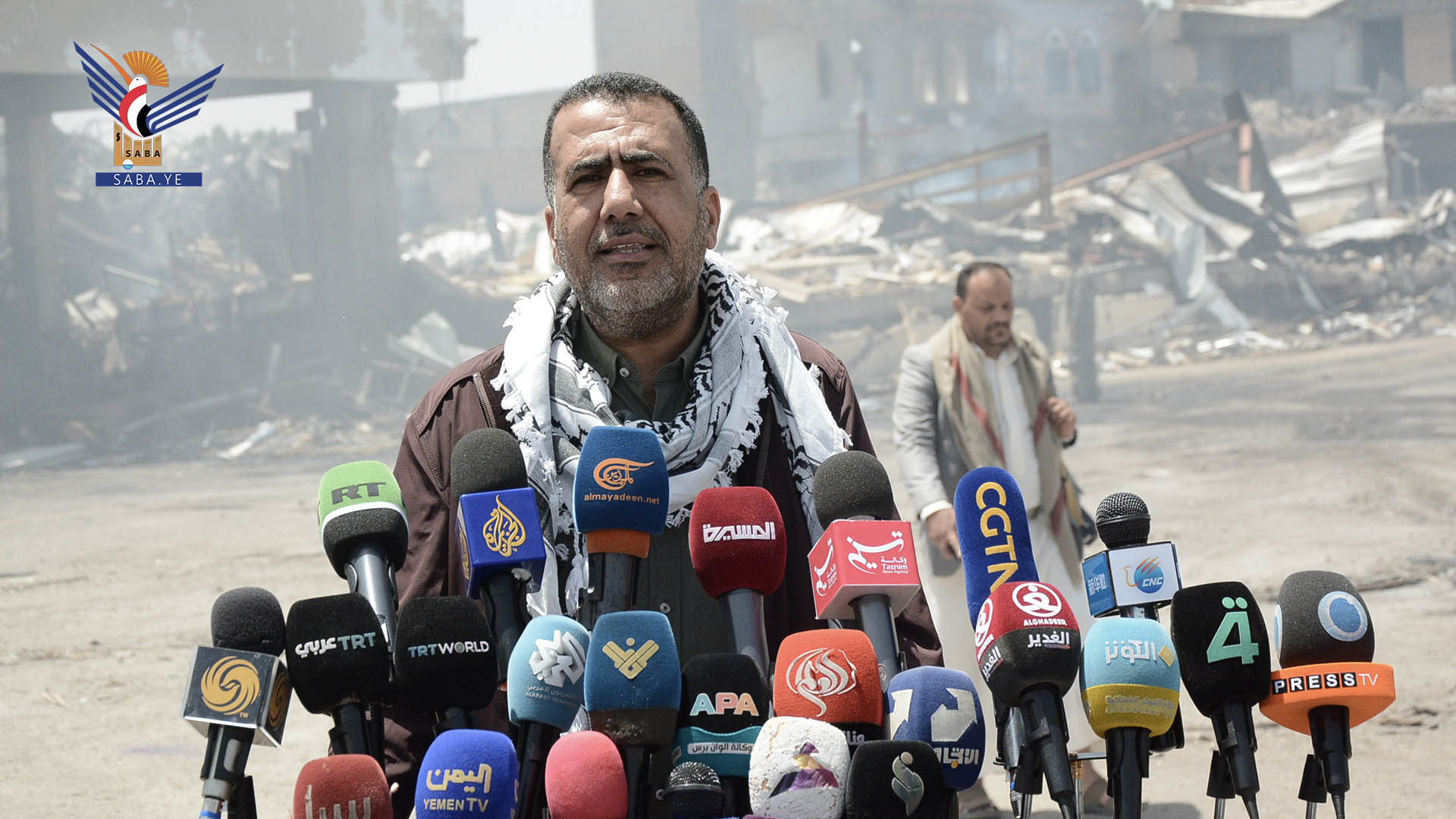Sana’a - Saba:
Yahya Al-Siyani, Deputy Minister of Transport and Public Works and Chairman of the General Authority for Civil Aviation and Meteorology, confirmed that Sana’a International Airport will be operational again as soon as possible to facilitate the return of stranded citizens abroad, particularly from Jordan, despite the severe damage caused by Israeli aggression.
During a press conference held on Wednesday at Sana’a Airport, attended by officials from the Ministries of Transport, Public Works, Justice , Human Rights, and Health and Environment, Al-Siyani explained that emergency teams immediately began firefighting and technical assessments following the airstrikes. A technical committee has also started preparations to rehabilitate the airport to resume humanitarian flights at the earliest opportunity.
He noted that work is underway to restore the airport’s operational, technical, and professional readiness to facilitate the return of stranded Yemenis and patients abroad. The airstrikes destroyed passenger terminals, airport facilities, runways, technical and operational systems.
The Deputy Minister added that the attack directly targeted several civilian aircraft, including two Airbus A320s and an A330 used for passenger transport, as well as other grounded aircraft due to the blockade, including a cargo plane and a Boeing 727.
Meanwhile, Khalil Jahaf, Acting Chairman of Yemenia Airways’ Board of Directors, stated that the airstrikes represented a direct attack on civilian aviation infrastructure. Preliminary estimates indicate damages exceeding half a billion dollars due to the destruction of aircraft, hangars, maintenance workshops, and ground service facilities. He affirmed that Yemenia Airways would soon resume navigation and humanitarian services, with technical teams currently working to restore the airport’s readiness.
For his part, Ali Taysir, head of the Human Rights Sector at the Ministry of Justice and Human Rights, stated that the U.S.-Israeli-British aggression failed to achieve any military objectives justifying the direct targeting of civilian infrastructure. He noted that the airstrikes on Sana’a Airport, Hodeidah and Ras Issa ports, Hazziz and Dhubhan power stations, and Amran and Bajil cement factories resulted in seven civilian deaths, 93 injuries, and around 20 others still missing under the rubble.
He condemned these attacks as blatant violations of international humanitarian law, the Chicago Convention on Civil Aviation, and the Geneva Conventions, urging a firm international stance against targeting vital civilian facilities.
Anis Al-Asbahi, spokesperson for the Ministry of Health and Environment, described the attacks on the airport and civilian infrastructure as "full-fledged war crimes." He stressed that targeting service facilities, particularly air and sea ports, exacerbates the health crisis and worsens the suffering of patients and wounded, especially those relying on Sana’a Airport as their sole exit for medical treatment abroad via Jordan.
Hospitals received 94 injured individuals in the past 24 hours, a non-final toll, with the aggression’s sponsors held fully responsible for these crimes and their humanitarian consequences.
At the end of the press conference, the Ministries of Justice and Human Rights, Transport and Public Works, and Health and Environment issued a joint statement strongly condemning the "Zionist-American" aggression on Yemen’s vital infrastructure, including Sana’a International Airport, power stations, cement factories, and Red Sea ports.
The statement emphasized that the attacks destroyed the airport’s buildings, terminals, main runway, control tower, electrical systems, radars, and navigation equipment, halting civilian and humanitarian flights—especially to Jordan—and disrupting travel for patients, students, and expatriates. Previous statistics indicate over 120,000 patients have died due to travel restrictions for medical treatment abroad.
The statement also condemned the targeting of Hodeidah Port, Ras Issa Oil Terminal, central power stations in the capital, and Amran and Bajil cement factories, which killed seven civilians and injured 93 (non-final toll). These attacks violate international humanitarian law, particularly Article 54 of the Additional Protocol to the Geneva Conventions and Article 8 bis of the Rome Statute of the ICC, which criminalizes targeting civilian survival infrastructure.
The ministries held the U.S. administration and the Zionist entity fully responsible for these crimes, calling on global advocates to act against the aggression on the Yemeni and Palestinian peoples. They also urged the UN, Security Council, Human Rights Council to fulfill their moral and legal obligations regarding these grave violations against civilians.

| more of (Local) |




